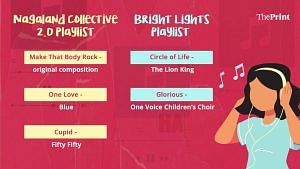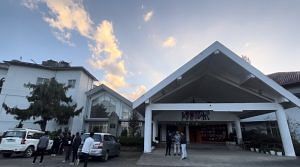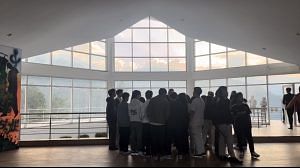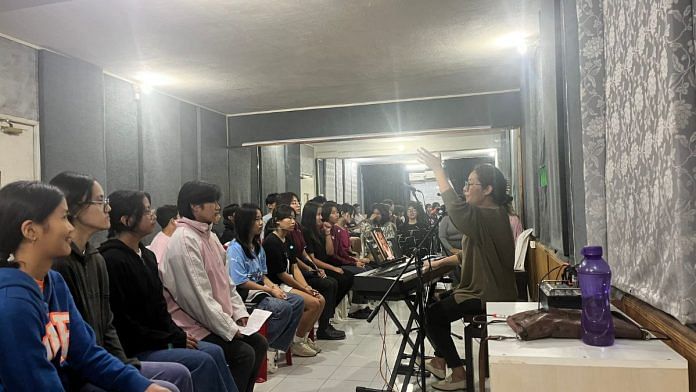Kohima: A cyclone was brewing in the Bay of Bengal on a November day, leading to incessant rain in Nagaland’s business district of Dimapur. But the downpour did not deter nearly 30 children and young adults from trickling into a music studio. They needed to rehearse for their upcoming performance at the Hornbill Festival – the state’s biggest annual cultural extravaganza, which is organised every year from 1 to 10 December.
The group, with members aged between nine and 20 years, huddled around a piano, all smiles and enthusiasm as they waited for instructions from their teacher. They had been in the spotlight before, having performed at the Northeast India Festival in Vietnam’s Ho Chi Minh City barely a fortnight ago. And last year, it was Bangkok.
The budding artistes were selected after a rigorous audition process from schools and colleges around Dimapur to be part of the Bright Lights Choir. Guiding their journey is the Nagaland government’s Task Force for Music and Arts (TaFMA), the driving force behind Hornbill.
In the four years since it was formed, TaFMA has emerged as the catalyst that’s making Nagaland’s soft power market-ready. It has scouts looking for talented musicians and singers in some of Nagaland’s remote villages and towns. It’s enabling a younger generation to take up music as a career through masterclasses and workshops. From bands and choirs to music festivals and concerts, it’s getting Naga musicians employed in premium hotels and even making inroads in the restaurant industry.

Nagaland wants to do with music what Argentina did with football, Russia with chess and gymnastics, and South Korea with all things K—export its music talent.
“TaFMA was specifically created on a mission mode under the Directorate of Youth Resources and Sports to look into the artistic expression of its younger lot,” said programme chairperson Theja Meru.
TaFMA even held a state-level talent search contest to find a member for its band, the Nagaland Collective. “It’s a K-pop band kind of concept,” explained Imnajungla Longkumer, a 16-year-old school student who joined Bright Lights two years ago and sees the choir as a training ground for her musical career.
Every state has a department to promote and preserve its traditional art and culture, but Nagaland realised that its contemporary and fusion music needed special attention. This led to the genesis of the Music Task Force (MTF) in 2013 under current Chief Minister Neiphiu Rio. In 2019, the government decided to expand the programme and include arts, painting and dance under its umbrella, renaming it TaFMA. Despite its wide scope, music remains TaFMA’s key focus.
TaFMA went on to partner with AR Rahman’s foundation in 2019. And now, it is collaborating with hospitality group Espire to catapult its young talent onto the national stage – both in the entertainment scene and the music business.
“The chief minister saw that it [music] was one area where young people could be encouraged to turn their hobby into gainful employment. That’s how TaFMA came into being,” Meru added.
Hunting for talent
Last year, the Hornbill Festival made national headlines when a guitarist belted the national anthem on her electric guitar. The artiste was 20-year-old Imnainla Jamir, whose latest musical offering and debut single, Bloom, was released on TaFMA’s YouTube channel.

It was TaFMA who noticed her as a young teenager, took her under its fold and is currently mentoring her.
“She is one of our most famous musicians today,” said Meru, proudly.
TaFMA doesn’t just comb the state’s main hubs of Dimapur and Kohima. The programme has eyes in all 16 districts of Nagaland. Jamir, after all, belongs to the small town?– yes of Mokokchung.
While it mostly relies on district partners and good old word of mouth to spot raw talent, TaFMA also scrounges social media sites like Instagram and YouTube to ensure no one slips through.
The Bright Lights Choir, which held its first auditions online during the Covid-19 pandemic, is one of TaFMA’s success stories. Longkumer auditioned for Bright Lights out of her love for music and travel. “Of course, we knew we would be going to different states. But we didn’t think we would make it that big,” she said. She’s been to Vietnam and Thailand, even though the choir has yet to perform in Indian states other than Nagaland.
Members of Bright Lights have gone on to become part of Nagaland Collective. This year, a second edition of the band has come together, with four men and four women aged under 24 years.
“I started singing when I was about 12 years old, and ever since, it has always been my passion to sing and explore music,” says Linoka Yepthomi, a member of Nagaland Collective 2.0. Apart from music, Yepthomi is pursuing a Bachelor’s degree in Social Work from Dimapur. She was selected to be a part of the Bright Lights Choir in 2021 and trained with it for a year.
Now that she has been selected for the Nagaland Collective, Yepthomi’s schedule is packed with singing, dance and etiquette ‘boot camps’.
The band will make its debut at the Hornbill Festival this year. Its playlist comprises an original composition, Make That Body Rock, and covers of Blue and Fifty-Fifty’s One Love (2003) and Cupid (2023), among others.

Also read: Kadak Singh’s Aniruddha Roy Chowdhury taking Bengali cinema beyond Bengal
Generating employment
Away from the Hornbill buzz, three Naga artistes in different parts of India – Dehradun, Ranthambore and Goa – rehearse every day to sing before crowds at luxury hotels.
They are full-time employees courtesy of an MoU signed between the Nagaland government and Espire Hospitality, which has enabled the state to send musicians to other parts of India.
“We have a programme to train people for the hotel industry,” said Meru. Under the Musicians’ Incubation Program or MIPro, artistes learn a hundred songs in English, Hindi, and Naga dialects.
“When they are ready, we give them platforms [to perform], and eventually, they sing in hotels to make a livelihood and get a salary,” Meru adds.
Widinkamlak began working at The Prominence, a four-star Country Inn hotel, earlier this year. He cleared an online audition to get through the MIPro programme. “I was one of the lucky individuals who got handpicked by TaFMA to secure a contract with Espire Hospitality,” he told ThePrint over text.
He describes his new role – and tracklist – as challenging but good. “People mostly come to dine and chit-chat, so the playlist often goes with slow and soft music.”
How it all started
As Nagaland gears up for the 24th instalment of Hornbill, Meru is busy preparing stages for the event’s opening ceremony.

Meanwhile, Bright Lights and Nagaland Collective 2.0 assemble at the Regional Centre of Excellence for Music and Performing Arts (RCEMPA) at Kohima’s Jotsoma, a hilly suburb replete with blooming cherry trees.
According to Meru, Nagaland has over a hundred music schools – a big number for a state with a tiny population of around 20 lakh (2011 Census).
Singing is not a skill in Nagaland. “Everyone here can sing,” said Bethel Tzuru, the creative director of Bright Lights. The secret is to find the most talented and train them.
According to Tzuru, Naga children are exposed to music early on. It is part of their community life, which revolves heavily around the church. Singing and playing instruments are common church activities.

“We always had choirs. Church has youth choirs, mothers’ choir, fathers’ choir, children’s choir, and jubilee choir. A church would normally have all these,” she said.
But the state wasn’t always overflowing with music institutes. Tzuru traces their origin to the 1970s. An American woman named Margaret Shishak started teaching piano so “passionately” at the Patkai Christian College that she inspired a generation of students to go and start their own music schools.
“There would be community church leaders, students coming in to study at the college. They would graduate and start their own little music schools, training in their own villages and districts,” recalls Tzuru.
It’s the same music school she – and Theja Meru – graduated from.
“It started to grow like that,” said Tzuru, though she remembers that until the late 1990s and early 2000s, there were only a handful of music schools in the state. The surge started in 2010, when the state government started taking interest in its musical talent.
Today, Tzuru runs her own music academy, Mountain Music School, in Dimapur, where 17 teachers offer one-on-one lessons to around 300 students. On paper, her school started in 2010, but Tzuru says that she and her four sisters have been offering music lessons from their bedroom since the 1990s.
Her school serves as the practice pad for Bright Lights members. “A former Bright Lights member is now part of The Nagaland Chamber Choir (TNCC) that won two gold medals at the 12th World Choir Games in August,” said Tzuru.
The choir, in the meanwhile, had to travel two hours from Dimapur to reach RCEMPA in Kohima for the Hornbill Festival rehearsals. Meru has asked Tzuru to give him “big sounds” for this year’s stage. They will perform Lion King’s Circle of Life and One Voice Children’s Choir’s Glorious.
At THE RCEMPA auditorium, everyone gathers to watch the performers practise. Suddenly, the sound of music reverberates across the cultural centre. The Bright Lights Choir assembles at the foyer, against the backdrop of sun rays breaking out from the clouds.
“It’s the circle of life, and it moves us all through despair and hope, through faith and love,” they sing.
(Edited by Zoya Bhatti)



